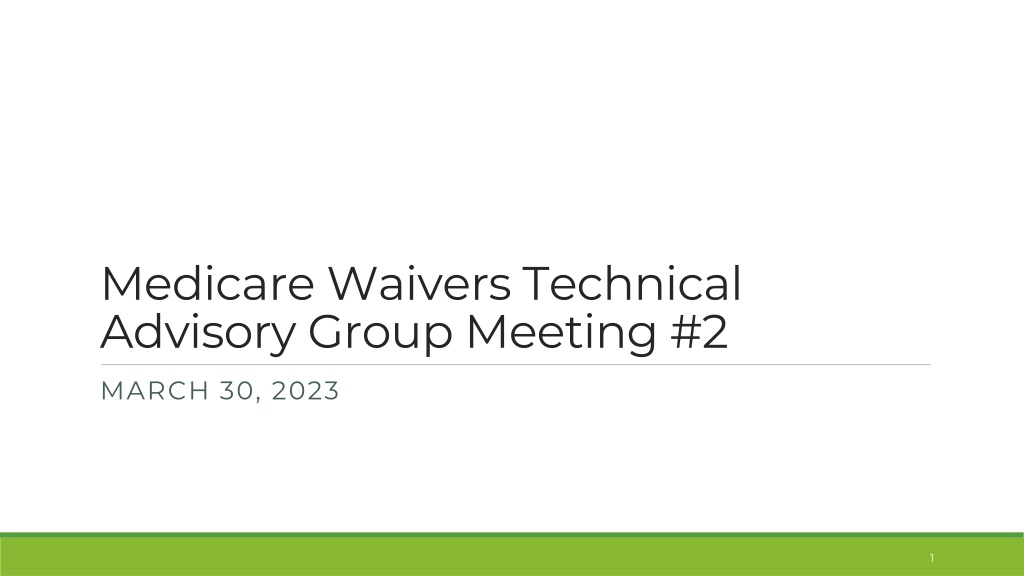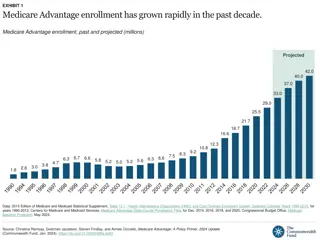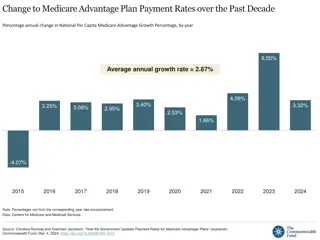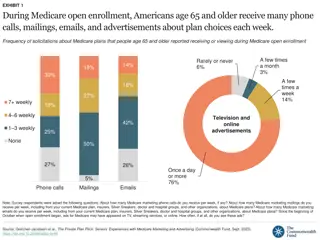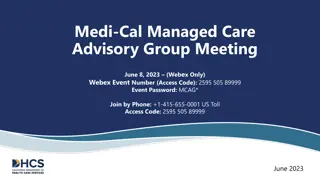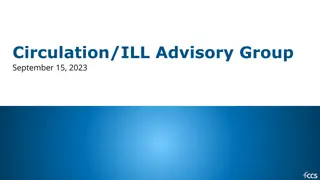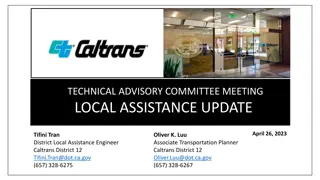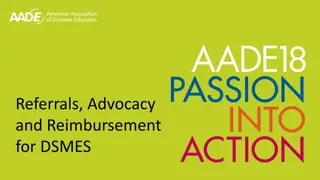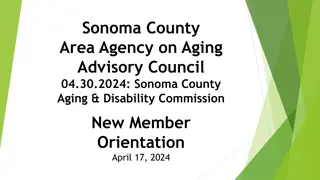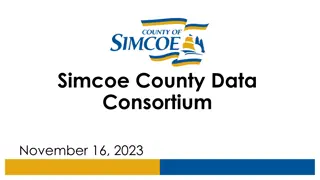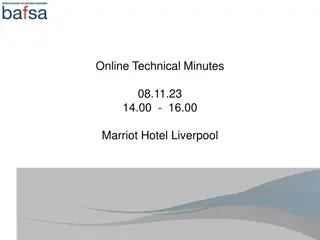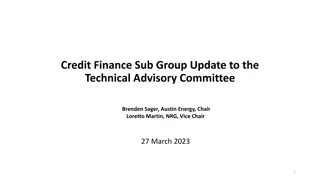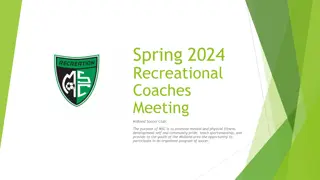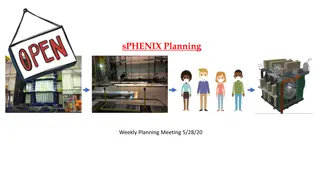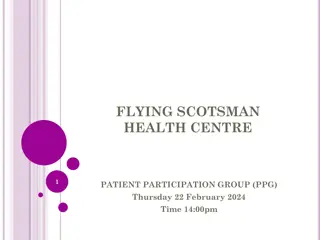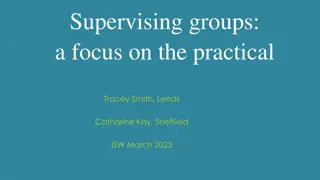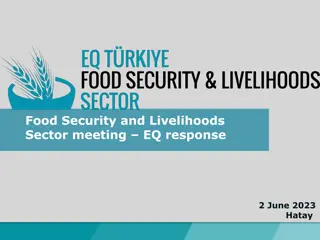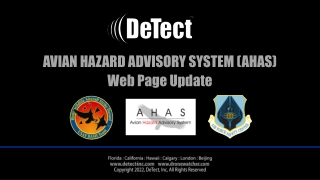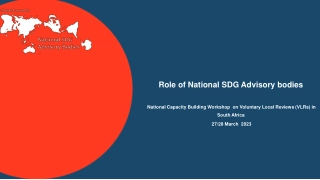Medicare Waivers Technical Advisory Group Meeting Recap
In this meeting, discussions focused on potential waivers related to skilled nursing facilities, hospice care, and future steps. The group aims to identify key asks on Medicare waivers for CMS to inform the AHEAD model design. The Theory of Change emphasizes that waivers are a means to implement desired care delivery models. Various waivers under consideration were outlined, including participation, shared savings, and physician self-referral law waivers.
Download Presentation
Please find below an Image/Link to download the presentation.
The content on the website is provided AS IS for your information and personal use only. It may not be sold, licensed, or shared on other websites without obtaining consent from the author. Download presentation by click this link. If you encounter any issues during the download, it is possible that the publisher has removed the file from their server.
Presentation Transcript
Medicare Waivers Technical Advisory Group Meeting #2 MARCH 30, 2023 1
Meeting Agenda 1. Recap of AHEAD task at hand and potential waivers 2. Recap of discussion in first Medicare Waivers TAG meeting on 2/14 3. Deeper dive on potential waivers related to skilled nursing facilities a. SNF PHE flexibilities (physician delegation, personal physician visits, temporary nurse aides) b. Flexibility for SNFs around billing c. 3-day SNF rule 4. Deeper dive on waiver related to hospice a. Hospice waiver that could allow for an expanded palliative care benefit for adults covered by Medicare 5. Next Steps 2
1. Recap Task at Hand and Current/Potential Medicare Waivers 3
Medicare Waivers Technical Advisory Group s Charge The group s primary goal is to identify the key asks on Medicare waivers to share with CMS to inform the design of the AHEAD model. CMMI is considering the types of waivers it could make available to states under the AHEAD model and welcomes Vermont s feedback. CMMI asked the State to indicate the most important asks. Include a clear policy rationale for updating existing waivers available under the VTAPM and/or requesting new waivers under the AHEAD model. Members have already provided some compelling examples. Vermont aims to understand: Problems that new or revised waivers could help address (e.g., discontinuity of care with transitions) On-the-ground experiences (successes, challenges) with implementing current waivers under the Vermont All-Payer ACO Model New waivers that are of interest to stakeholders 4
Theory of Change for Medicare Waivers Medicare waivers are a means to an end, not the end itself. Logic should be: What are the care delivery models we want to see implemented in Vermont? How do those care delivery models advance outcomes? What waivers do we need to implement the models? Successful implementation of similar flexibilities by Medicaid and other payers is relevant and is likely to be of interest to CMMI. 5
Medicare Waivers Under Consideration This workgroup will be primarily focused on care delivery waivers. Work on the participation/fraud and abuse waivers is pending based on global budget design discussions (separate workgroup). Category Existing Under Current VTAPM Potential New Waivers Participation Waiver Shared Savings Distribution Waiver Physician Self-Referral Law Waiver Waiver for Patient Engagement Incentives AIPBP Payment Arrangement Waiver Waivers found in CHART model: o Waiver of Certain Medicare Hospital and/or CAH Conditions of Participation (CoPs) o 96-hour Certification Rule Participation/ Fraud and Abuse Telehealth Expansion Benefit Enhancement o Waivers of Originating Site Requirements o Waiver of Interactive Telecommunications System (teledermatology and teleophthalmology services) Telehealth Allow use of telehealth in SNFs for physician services Discussed during 2/14 meeting. Services at Home Care Management Home Visits Post-discharge Home Visits Home health expansion/flexibilities Allow SNFs to bill Medicare directly for physician services provided by locum physicians. For beneficiaries in SNFs, o Physician delegation of tasks to a physician assistant, nurse practitioner o Personal physician visits not already exempted by 483.30(c)(4) Temporary nurse aide waiver Telehealth (as above) Focus of today s discussion SNF 3-day SNF Rule Payment Hospice Allow expanded palliative care benefit for adults Allow for Medicare reimbursement for Licensed Alcohol and Drug Counselors, Licensed Clinical Mental Health Counselors, Licensed Psychologists, Licensed Psychiatric Nurses, and Licensed Marriage and Family Counselors MH/SUD Access 6
Medicare Waivers Within the Context of the Care Continuum The individual is discharged to a skilled nursing facility. The individual is discharged to the home and may require home care. An individual is admitted to a hospital and requires an inpatient stay. The individual requires care from their primary care provider and other specialists. 3-day SNF Rule Allowing SNFs to bill Medicare directly for physician services provided by locum physicians Physician delegation of tasks in SNFs Personal physician visits Temporary nurse aides Use of telehealth in SNFs for physician services Telehealth waiver of originating site requirements Telehealth waiver of interactive telecommunications system Post Discharge Home Visits Care Management Home Visits Home health expansion/flexibilities 7
Recap from 2/14: ACO REACHS Home Health Homebound Waiver This waiver under ACO REACH allows expansion of Home Health for Medicare beneficiaries with multiple chronic conditions who are at risk of unplanned inpatient admissions. Feedback Received Interest in discussing with CMS Some concerns with the requirement around the need for skilled services OneCare s Longitudinal Care Pilot Program is helpful because participants do not need to have a demonstrated need for skilled services To improve uptake and implementation of waiver, direct payments to home health providers for provision of services under this waiver would be important Eligibility Otherwise qualify for home health services under 42 CFR 409.42 except that the beneficiary is not required to be confined to the home; and Have at least 2 chronic conditions as defined by CMS (i.e., condition that requires ongoing assessment and treatment that is documented in the beneficiary s plan of care); and Have 1 of 3 indicators: inpatient service utilization, frailty, and/or social isolation; and Not be receiving services under the Post-Discharge Home Visits Benefit Enhancement or the Care Management Home Visits Benefit Enhancement o Personnel ACO to identify home health providers that are Participant Providers or Preferred Providers who would offer these services to eligible beneficiaries Implementation CMS will provide the ACO with a Home Health Homebound Waiver form template to document these eligibility criteria ACO shall ensure that a completed and certified form is maintained in the beneficiary s medical records 8
Recap from 2/14: Post Discharge Home Visits The post discharge home visit waiver is identical under the VTAPM and ACO REACH. Feedback Received Topic VTAPM and ACO REACH Eligibility Criteria Does not qualify for Medicare coverage of home health services under 42 CFR 409.42 or does qualify for Medicare coverage of home health services on the sole basis of living in a medically underserved area; and Discharged from the acute inpatient hospital, inpatient psychiatric facility, inpatient rehabilitation facility, long-term care hospital, or SNF Concept of a waiver to allow for post-discharge care (as opposed to discharge from Home Health) is sound Challenges around implementing this waiver under current VTAPM due to contracting and billing issues Home Health agencies had to contract with individual physicians, who hold responsibility for billing and reimbursing home health. Personnel Furnished by auxiliary personnel under general supervision of ACO- participating provider (42 CFR 410.26) Service Delivery No more than 9 times in the first 90 days following discharge The 9 home visit services do not accumulate across multiple discharges; if the beneficiary is readmitted within 90 days of the initial discharge and before receiving nine home visits, the beneficiary may receive only nine home visits in connection with the subsequent discharge. The beneficiary cannot receive the remainder of the nine home visits associated with the initial discharge. 9
Recap from 2/14: Care Management Home Visits There are slight differences between the care management home visit waiver under the current VTAPM and the newer ACO REACH. Topic VTAPM ACO REACH Eligibility Criteria Determined to be at risk of hospitalization; and Has a care treatment plan initiated by the ACO- participating provider; and Not eligible for the Post Discharge Home Visits Benefit Enhancement; and Does not qualify for Medicare coverage of home health services under 42 CFR 409.42 or does qualify for Medicare coverage of home health services on the sole basis of living in a medically underserved area Determined to be at risk of hospitalization; and Has a care treatment plan initiated by the ACO- participating provider; and Not currently utilizing the Post-Discharge Home Visits Benefit Enhancement or the Home Health Homebound Waiver Benefit Enhancement; and Does not qualify for Medicare coverage of home health services (unless the sole basis for qualification is living in a medically underserved area) Feedback Received [See previous slide issues with contracting and billing. To verify with group.] Personnel Furnished by auxiliary personnel under general supervision of ACO-participating provider (42 CFR 410.26) Furnished by auxiliary personnel under general supervision of ACO-participating provider (42 CFR 410.26) Service Delivery No more than 2 times within 90 days of the beneficiary seeing the ACO-participating provider who initiated the care management plan Beneficiary may receive 1 additional care management home visit within 90-day period if they first have an in-office visit with the ACO- participating provider May receive up to 20 care management home visits within a calendar year 10
Discussion: Improvements in Care Delivery and Transitions Framing Question: How could greater Medicare payment flexibilities support better care for SNF residents within the SNF and help them transition to a lower intensity setting more expeditiously? An individual is admitted to a hospital and requires an inpatient stay. The individual is discharged to a skilled nursing facility. 12
#1: SNF Flexibilities Available During the PHE Current State. The following waivers were in effect during the COVID-19 public health emergency. However, they have since been terminated: Physician Delegation of Tasks in SNFs: CMS waived the requirement in 483.30(e)(4) that prevents a physician from delegating a task when the regulations specify that the physician must perform it personally. This waiver has given physicians the ability to delegate any tasks to a physician assistant, nurse practitioner, or clinical nurse specialist who meets the applicable definition in 42 CFR 491.2 or, in the case of a clinical nurse specialist, is licensed as such by the state and is acting within the scope of practice laws as defined by state law. Terminated on 5/7/22. Physician Visits: CMS waived the requirement at 483.30(c)(3) that all required physician visits (not already exempted in 483.30(c)(4) and (f)) must be made by the physician personally. This permits physicians to delegate any required physician visit to a nurse practitioner, physician assistant, or clinical nurse specialist who is not an employee of the facility, who is working in collaboration with a physician, and who is licensed by the state and performing within the state s scope of practice laws. Terminated on 5/7/22. Training and Certification of Nurse Aides. CMS waived the requirements at 483.35(d), except for 483.35(d)(1)(i)). To ensure the health and safety of nursing home residents, CMS did not waive 483.35(d)(1)(i), which requires facilities to not use any individual working as a nurse aide for more than four months, on a full-time basis, unless that individual is competent to provide nursing and nursing related services. CMS temporarily waived these requirements so they do not present barriers for SNFs and NFs to hire staff; the temporary waiver helped these facilities provide adequate levels of staffing for the duration of the COVID-19 pandemic. Terminated on 6/6/22. Source: Long Term Care Facilities (Skilled Nursing Facilities and/or Nursing Facilities): CMS Flexibilities to Fight COVID-19 13
Discussion: SNF PHE Flexibilities What have been the successes and/or challenges with implementing these waivers during the PHE? How has care delivery been impacted as a result of these waivers being terminated? 14
#2: SNF Flexibility Around Billing Feedback Received to Date: To expand SNFs abilities to attract solo physicians and use locums, SNFs should have the flexibility to bill Medicare directly for those physician services. Currently the physician, physician practice, hospital, or FQHC must do the billing. Physicians do not want the administrative burdens associated with billing. In situations where some SNFs are contracting with a vendor for locums, nobody can bill for the physician services. The vendor cannot because it is not Medicaid/Medicare certified. SNFs are Medicaid/Medicare certified but do not technically provide the service. They are responsible for ensuring it is provided. Therefore, they can t bill. If the SNF had the flexibility to bill, they could engage in flat fee contracts with physicians for services, and recoup Medicare dollars to cover the costs. 15
Discussion: SNF Billing Flexibility Based on our review of recent CMMI models, no existing model has this flexibility. Should Vermont seek to advance this concept with CMS? 16
#3: 3-day SNF Rule Waiver The 3-day SNF rule waiver is available under many CMMI models, including MSSP, CHART, ACO REACH, and VTAPM. Eligibility Under VTAPM (but criteria is similar across all models) An eligible SNF is a SNF or Swing-Bed Hospital that is an Initiative Participant or Preferred Provider that has: Entered into a written agreement with the ACO to provide SNF services in accordance with the SNF 3-Day Rule Waiver Benefit Enhancement;and Been identified by the ACO as having agreed to participate in the 3-Day SNF Rule Waiver Benefit Enhancement; and Been approved by CMS to participate under the 3-Day SNF Rule Waiver Benefit Enhancement following a review of the qualifications of the SNF or Swing Bed Hospital to accept admissions without a prior inpatient hospital stay and admissions after an inpatient stay of fewer than 3 days Must have an overall rating of 3+ stars under the CMS 5-Star Quality Rating system in 7 of the previous 12 months as reported on the Nursing Home Compare website* Update to 3-Day SNF Rule Waiver CMS has expanded the eligibility criteria for SNFs to participate in the 3-day SNF Rule Waiver. This additional flexibility is intended to increase access to care. A beneficiary is eligible to receive services under this waiver if they are: An initiative beneficiary at the time of admission to an Eligible SNF under this waiver or within the grace period Not residing in a SNF or LTC Facility at the time of admission to an Eligible SNF under this waiver (independent living facilities and assisted living facilities shall not be deemed LTC facilities) Currently, only SNFs with 12 or more months of data reported on the Nursing Home Compare website can participate in the 3-day SNF Rule Waiver (as long as they have a rating of 3+ stars for 7 of the past 12 months). A direct SNF admission will be covered if, at the time of admission, the beneficiary is: Is medically stable Has confirmed diagnoses Has been evaluated by a physician or other practitioner licensed to perform the evaluation within 3 days prior to admission to the eligible SNF Does not require inpatient hospital evaluation or treatment; and Has a skilled nursing or rehabilitation need that is identified by the evaluating physician or other practitioner and cannot be provided as an outpatient Under ACO REACH, newer SNFs with 6-11 months of data reported on Nursing Home Compare can participate in the 3-day SNF Rule Waiver starting July 1, 2023 as long as they meet CMS requirements around number of months with ratings of 3+ stars (see page 265). A SNF or Swing Bed Hospital Admission will be covered for a beneficiary who is discharged to an Eligible SNF after fewer than 3 days of the inpatient hospitalization only if, at the time of admission, the beneficiary is: Is medically stable; Has confirmed diagnoses Does not require further inpatient hospital evaluation of treatment; and Has a skilled nursing or rehabilitation need that has been identified by a physician or other practitioner during the inpatient hospitalization and that cannot be provided on an outpatient basis Source(s): Appendix D of VTAPM 2019 Participation Agreement;pp. 71-72 of ACO REACH 2022 Request for Applications; Appendix I of ACO REACH 2022 Model Performance Period Participation Agreement (2023 Starters) 17
Discussion: 3-Day SNF Rule Waiver What are the current challenges around implementing the 3-day SNF waiver under VTAPM? What are the group s reactions to the ACO REACH flexibility around allowing newer SNFs to participate in the 3-day SNF Rule waiver? Would be beneficial in Vermont? 18
4. Deeper Dive on Waiver Related to Hospice 19
Rationale/Philosophy for Hospice Waiver When a Medicare beneficiary elects the Medicare hospice benefit, they must forgo Medicare coverage for treatment of their terminal illness (i.e., curative care) to receive hospice services. The requirement to cease curative treatment may hinder beneficiaries from choosing hospice care. National data show that slightly fewer than half of Medicare decedents received hospice care in 2021 and most only used hospice care for a short period of time (17 days). Vermont is on the lower end of Medicare hospice utilization, ranking #38 out of 50 states in 2020. 44.5% of Medicare decedents in Vermont used hospice, compared with a national average of 47.8%. This is problematic since hospice care improves quality of life and health care outcomes for individuals and their families. The Medicare hospice benefit includes services such as symptom management and pain control, counseling, and support services for family. A Medicare hospice waiver would remove this barrier by allowing beneficiaries to receive hospice care and curative care simultaneously. This would also align with Vermont Medicaid s approach. 20 Source(s): March 2023 MedPAC Report to Congress; Hospice Coverage; NHPCO Facts and Figures 2022 Edition
Vermonts Medicaid Policy Around Hospice Medicaid-Enrolled Adults. Vermont has the authority through the Section 1115 demonstration to provide coverage for hospice services concurrently with palliative and curative services for adults enrolled in Medicaid. However, this has not been implemented due to the need for appropriations. Alignment with Medicare would mitigate cost impacts. Medicaid-Enrolled Children (under age 21). Under the state plan, children and youth under 21 receiving hospice care may continue to receive curative services. 21
For Consideration: CMS Hospice Waiver in ACO REACH Detail on Medicare Hospice Waiver in ACO REACH This waiver under ACO REACH allows Medicare beneficiaries to receive hospice and curative care simultaneously. Currently, under Section 1812(d)(2)(A) of the Act, beneficiaries who elect the Medicare Hospice Benefit give up their right to receive curative care. Personnel ACO to identify hospice and non-hospice providers and suppliers to participate under this benefit enhancement. These providers must be Participant Providers or Preferred Providers. Implementation CMS will require ACOs to include the following information in their implementation plans: Description of how the identified Participant Providers and Preferred providers will have the appropriate staff capacity and necessary infrastructure to carry out proposed care coordination activities; and Explanation of how the ACO will ensure, working with participating hospices and non-hospice providers and suppliers, that an appropriate plan of care will be developed for all beneficiaries receiving concurrent care and that these beneficiaries will be fully informed of what care or services would or would not be included in their care plan, what clinician or organization would be providing which services, how care coordination would be achieved, and whether there are any limitations; and Explanation of how the ACO will ensure that the beneficiary or his/her representative is fully aware of the care plan and informed of the beneficiary s right to revoke the hospice election at any time consistent with current law Medicare will retain its existing claims-based edits to prevent non-hospice claims from processing while a beneficiary is under hospice election, except with respect to services furnished by those hospice and non-hospice providers and suppliers identified by the ACO as participating in this benefit enhancement Medicare FFS claims submitted by these organizations will be paid by Medicare if they are otherwise appropriate for payment absent the restrictions on paying claims for a beneficiary that has elected hospice 22 Source(s): pp. 74-75 of ACO REACH 2022 Request for Applications
Discussion: Potential Hospice Waiver Discussion Questions: What are the group s reactions to the waiver under ACO REACH? Should Vermont consider advancing a request for the same or similar flexibility? What are the lessons learned so far from implementation of the VT Medicaid Hospice Benefit? What other features should be considered in order to align with Medicaid to the maximum extent possible? If this waiver were to be available under the AHEAD model, would there be implementation challenges? 23
Next Steps AHS is continuing to discuss internally on engaging directly with care providers on these topics. AHS expects to discuss Medicare waivers with CMMI in late Spring or early Summer. The next two Medicare Waivers Technical Advisory Group meetings will be on Tuesdays from 9:00 10:00 am and will focus on the topics below. 4/11: Telehealth, MH/SUD personnel 4/18: Wrap up 25
